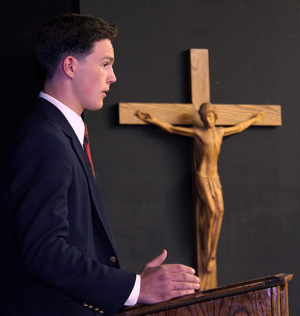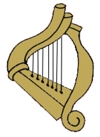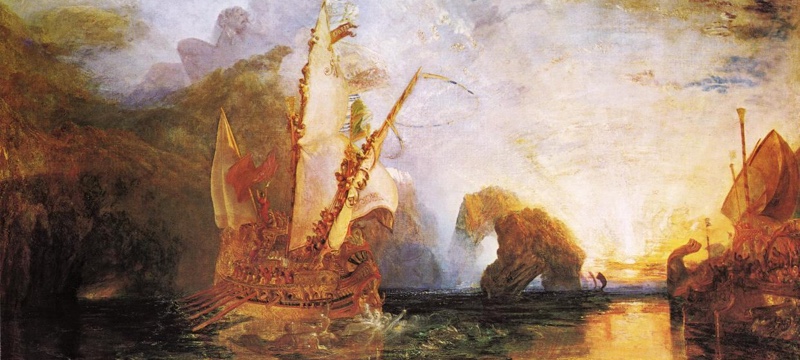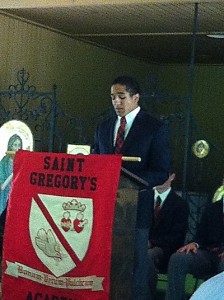by David Hahn
Dear families, faculty, and friends,
 It is my honor to address you all today. For those of you who don’t know me, my name is David Hahn, and I am the son of the renowned writer and speaker, Kimberly Hahn.
It is my honor to address you all today. For those of you who don’t know me, my name is David Hahn, and I am the son of the renowned writer and speaker, Kimberly Hahn.
My three years at Gregory the Great Academy will always be among my fondest. The warm times spent in song after banquets, the frigid times spent on the rugby pitch, or the cool moments of silence with my brothers in prayer. From Sophomore Nights up on the fourth floor at Pine Hill, to our Junior trip to Fontgombault, or our many Senior Nights in the Culley Cabin, these are the times that will be enshrined in my memory forever. They will linger like old friends for the rest of my life and remain a link forever to my brothers here with me on this stage. I have been blessed by Our Lord these past three years with nineteen of the closest friends I will ever have. I count myself privileged to have gone upon this journey with these companions, these comrades—and though it is to be seen if we will take what we have been given to become heroes, we have certainly shared the epic journey that heroes often undergo.
It is often said that in an epic quest, the most important thing that the wanderer finds is actually not his initial goal—be it a lost treasure, or a forgotten kingdom—but rather, the most important thing he discovers is himself. As Telemachus searched for Odysseus, the boy learned what kind of a man lay dormant in his blood and what his destiny as the man he was called to become directed. Today, we have reached the end of our odyssey, and we look ahead with a new knowledge of ourselves and what we are called to do as men.
When I came to St. Gregory’s my Sophomore year, I was not familiar with the ancient forms of the Mass. The traditions of the Catholic Church were as familiar to me as they are for any boy, I suppose. And so, when I arrived, I really didn’t know what I was getting myself into. As it turns out, my experience of the liturgy here at the Academy has been central to my time here, and it is the one experience that reflects my entire education. I was raised attending our local parish in a family with a Presbyterian background. What I found at St. Gregory’s was not the liturgy or the praise-and-worship that I was used to. I was exposed here to a liturgical diversity, especially in the Byzantine rite.
Though it was strange at first, I quickly came to fall in love with the structure and the poetry of the Mass, and most of all, by the musical traditions that bind East and West into a chorus of divine praise. I came to know anew what I had always known, but never understood: the tradition of my Faith. Much in the same way as I was converted to appreciate the many beauties of the Divine Liturgy, I was drawn into a new understanding of the Roman rite, seeing in its structure a common purpose which is the purpose of salvation and the depth of the sacred traditions. Through these traditions and the experience of the liturgy, I was brought into a new experience of my place in the divine family and my spiritual heritage.
I never knew how hesitant I was to encounter real experiences until I came to Gregory the Great, and I was thrown headlong into a new world of tremendous meaning and mystery. And I was introduced to this vast vision through small instances. I remember arriving there on my first day at Carpathian Village. It was slightly rainy and I had just received news that we were going for a hike. I remember shuffling up to Headmaster Fitzpatrick and saying, “Sir, it’s raining… but we’re going for a hike?” He looked at me and said, “Yes, David.” I retorted, a little frustrated, “But it’s raining! How is this going to work?” His eyes gave a kind of sparkle and with a smile is his voice he said, “You’ll probably get wet—and that’s all right.” And wet I got—and it was all right. There were many more such little experiences like this in my first weeks and months at school where I was challenged to step outside of myself and see what I was made of—to learn who I was in the context of things like rain, rugby, and religion. Looking back at the time I thought of myself as a pretty adventurous guy, but this notion was quickly shattered once I began to learn what being adventurous really meant and what being a man really was. My time here was not easy, but just as with the liturgy, I was slowly won over, and came to see the truth that anything worth doing comes at cost.
Just as the sacred music of the liturgy brought me into contact with the beauty of the Faith, so the folk tradition brought me to love the beauty of ordinary experiences and with a new family. What this all comes down to is this: I was introduced to the experience of goodness, truth, and beauty at this school and with these men. This is a fact exemplified by a small yet defining moment the night after the hike in the rain. We all gathered around a large bonfire and one of the guys had two tin whistles in his hand. I asked if I could try it out. Soon enough, Thomas Lawless and I were whistling out The Rising of the Moon, and any other tunes we knew. Though it may not sound like much, it is in the little things that the most important things are often found.
As my classmate, Jack Davis, put it, Gregory the Great has given us a love and appreciation of the good things, the little things: books, music, a cup of coffee, a day of hard work. It’s a place where we’ve shared real, physical experiences with one another, whether easy or tough, in a joyful way. We have shared a taste, we twenty, of what is truly good. We have experienced together something of what it means to experience anything at all through our daily prayer life, the sacrifice of teammates toward victory, and our mutual pursuit of the truth by study.
This sharing of experiences, both big and small, has given us a brotherhood that is unique, both in its depth and its breadth that shall fill up our lives, and never cease to be a blessing to us. So often, when we set out with some good in mind, God seems to love to interfere and turn it all towards something better than we could have hoped for. I came to Saint Gregory’s looking for a friend, and I’m leaving it with nineteen brothers. When I became a student, I wasn’t a boy enrolled at a school. I was a son adopted into a family. A family of war heroes and of poets, and their stories were sung by our own voices—a family of faith and of prayer. I remember one night after I had gotten into a fight, I was brought into Mr. Culley’s office. He listened to my rather hysterical side of the story patiently and then simply told me to pray three Memorares for the next twelve days. My life at St. Gregory’s has never ceased to be blessed by that advice, to turn to in times of hardship. I still pray those three Memorares every day to this day. They have helped me to find myself and to learn who I am.
I would like to thank everyone who has made Gregory the Great Academy a place for boys to experience, and for giving me a home for these past three years. I thank all my classmates for your loyalty, your friendship, and your fraternity. I thank my coaches and teachers for gifting us with this experiential education, for the dedication of your lives to deepen ours. Thank you, Mom and Dad, for the sacrifice I know you made sending me to this school. Thank you to all for these years of study, of play, of fellowship, and of grace. Thank you for your prayers and your support, and for believing that a place like this can and should exist for boys like me. Thank you.

 There is something ethical about music. I would dare to further this thought of Plato’s by saying that there is something mystical about music. Music has the power to awaken and enliven the spirit. It is spiritual. It is religious. Nations have been bound together by their songs, and the rising and falling dynamics of those nations’ music are intimately connected with the rising and falling of their ethics. The power of song lies in its ability to move the soul. This soul-swaying power of music, that power that persuades and inspires, binds souls; and it is in this forge that our Class’s friendship was wrought. Within the songs of Gregory the Great Academy are linked memories, memories that will be remembered at their sound and with their sound. They are memories that, as alumni, we will hold dear to our hearts because in them is reflected the Good, the True, and the Beautiful.
There is something ethical about music. I would dare to further this thought of Plato’s by saying that there is something mystical about music. Music has the power to awaken and enliven the spirit. It is spiritual. It is religious. Nations have been bound together by their songs, and the rising and falling dynamics of those nations’ music are intimately connected with the rising and falling of their ethics. The power of song lies in its ability to move the soul. This soul-swaying power of music, that power that persuades and inspires, binds souls; and it is in this forge that our Class’s friendship was wrought. Within the songs of Gregory the Great Academy are linked memories, memories that will be remembered at their sound and with their sound. They are memories that, as alumni, we will hold dear to our hearts because in them is reflected the Good, the True, and the Beautiful.
